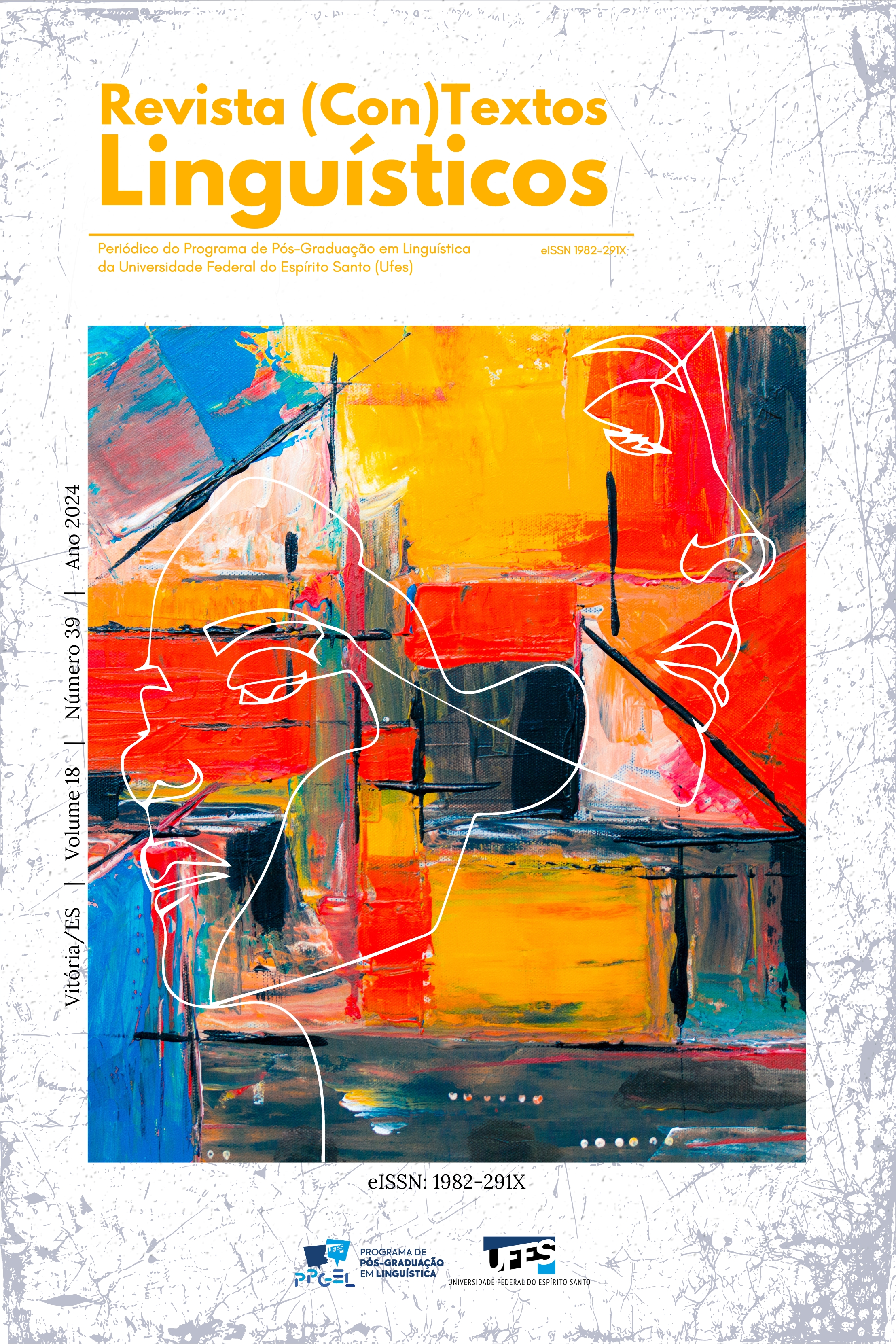Sentido e referência na interpretação de situações-problema em matemática
a importância da escolha lexical
DOI:
https://doi.org/10.47456/rctl.v18i39.43880Palavras-chave:
Semântica formal, Semântica referencial, Interface linguagem-matemáticaResumo
Este artigo visa investigar a dificuldade de interpretação dos enunciados de problemas matemáticos, analisando as relações semânticas entre a linguagem natural dos enunciados e sua tradução para a linguagem matemática na resolução. Dividido em dois momentos, o estudo envolveu inicialmente a observação de quatro alunos do 6º ano para entender como interpretavam enunciados simples, seguido pela análise de quatro situações-problema sobre porcentagem de diferentes anos escolares (6º, 7º e 8º anos). O objetivo foi identificar dificuldades na interpretação dos enunciados matemáticos, dada a necessidade de pensamento lógico-formal. Contrariando a ideia comum de baixa alfabetização em língua materna e linguagem matemática, o estudo analisou diversos motivos e aspectos linguísticos e estruturais que apresentam desafios, além dos próprios desafios matemáticos, para alunos proficientes em ambas as áreas. Para melhor compreender, nos baseamos nos pressupostos de Frege (1978) sobre Sentido e Referência e no conceito de Composicionalidade. A análise foi realizada primeiramente por meio de questionários aos alunos, seguida pela análise detalhada dos enunciados dos textos didáticos, destacando a recorrência termos indicados pelos participantes como desconhecidos. Assim, a escolha lexical foi identificada como um desafio significativo, afetando diretamente a compreensão e a interpretação dos alunos.
Downloads
Referências
AGOSTINI, T. D. Estrutura e interpretação de situações-problema em matemática: uma análise baseada na semântica formal. 2019. Tese (Doutorado em Linguística) – Departamento de Letras, Universidade Federal de São Carlos, São Carlos, 2019.
BARCELLOS, J. S. “Esse é mais difícil por causa das palavras”: uma investigação psicolinguística acerca do papel da linguagem na resolução de problemas matemáticos de divisão. 2017. 178 f. Dissertação (Mestrado em Letras/Estudos da Linguagem) – Departamento de Letras, Pontifícia Universidade Católica do Rio de Janeiro, Rio de Janeiro, 2017.
CÂNDIDO, P. T. Comunicação em Matemática. In: SMOLE, K. S.; DINIZ, M. I. (org.). Ler, escrever e resolver problemas: habilidades básicas para aprender Matemática. Porto Alegre: Artmed. p. 15-28, 2001.
CHIERCHIA, G. Partitives, reference to kinds and semantic variation. Semantics. Critical concepts in linguistics, v. 3, p. 415-446, 2003.
CHOMSKY, N. Language and the problems of knowledge. Cambridge: MIT Press, 1988.
CHOMSKY, N. Sobre natureza e linguagem. São Paulo: Martins Fontes, 2006.
CORREIA, D. V. M. Complexidade sintáctica: implicações na compreensão de enunciados de exercícios de Matemática. In: ENCONTRO NACIONAL DA ASSOCIAÇÃO PORTUGUESA DE LINGUÍSTICA, 20, 2004, Lisboa. Actas do XX Encontro Nacional da Associação Portuguesa de Linguística. Lisboa: APL, 2004. p. 445-469.
DANTE, L. R. Didática da resolução de problemas de matemática - 1ª a 5ª séries. Para estudantes do curso Magistério e professores do 1º grau. 12. ed. São Paulo: Ática, 2003.
DANTE, L. R. Projeto Teláris Matemática. 2. ed. São Paulo: Ática, 2015.
FREGE, F. L. G. Lógica e filosofia da linguagem. São Paulo: Cultrix, 1978.
FREGE, F. L. G. Philosophical and mathematical correspondence. 1982.
FREGE, F. L. G. Begriffsschrift, a formula language, modeled upon that of arithmetic, for pure thought. In: VAN HEIJNOORT, J. (ed.). From Frege to Gödel. Lincoln: to Excel Press, 1999. p. 1-82.
GRANELL, C. G. A aquisição da linguagem matemática: símbolo e significado. In: TEBEROSKY, A.; TOLCHINSKY, L. (org.). Além da alfabetização: a aprendizagem fonológica, ortográfica, textual e matemática. São Paulo: Ática, 2003.
LORENSATTI, E. J. C. Linguagem matemática e língua portuguesa: diálogo necessário na resolução de problemas matemáticos. Revista Conjectura, Caxias do Sul, v. 14, n. 2, p. 89-99, 2009.
MORTARI, C. A. Introdução à lógica. São Paulo: Unesp, 2001.
PARTEE, B. H. Nominal and temporal anaphora. Linguistics and philosophy, p. 243-286, 1984.
POLYA, G. A arte de resolver problemas. Trad. Heitor Lisboa de Araujo. Rio de Janeiro: Interciência, 2006.
OLIVEIRA, R. P. Semântica. In: MUSSALIM, F.; BENTES, A. C. (org.). Introdução à linguística: domínios e fronteiras. São Paulo: Cortez, 2001a. v. 2. p. 17-46.
OLIVEIRA, R. P. Semântica formal: uma breve introdução. Campinas: Mercado de Letras, 2001b.
OLIVEIRA, R. P.; BASSO, R. M. A Semântica, a pragmática e os seus mistérios. Revista Virtual de Estudos da Linguagem – ReVEL, v. 5, n. 8, 2007. Disponível em: https://www.revel.inf.br. Acesso em: 10 mar. 2018.
SILVEIRA, A. N. S. Semântica formal: uma proposta para a interpretação de texto na educação básica. 2014. 17 f. Trabalho de Conclusão de Curso (Graduação em Letras) – Departamento de Linguística, Português e Línguas Clássicas – Universidade de Brasília, Brasília, 2014.
SINGER, J. A.; KOHN, S. A.; RESNICK, L. B. Knowing about proportions in different contexts. In: NUNES, T.; BRYANT, P. (org.). Learning and teaching mathematics: an international perspective. Hove: Psychology Press, 1997. p. 115-132.
SOUSA, O. C.; CARDOSO, A. (ed.). Desenvolver competências em língua. Percursos didácticos. Lisboa: Colibri/CIED, 2010.
Downloads
Publicado
Edição
Seção
Licença
Copyright (c) 2024 Revista (Con)Textos Linguísticos

Este trabalho está licenciado sob uma licença Creative Commons Attribution-NonCommercial 4.0 International License.
Autores cedem os direitos autorais do artigo à editora da Revista (Con)Textos Linguísticos (Programa de Pós-Graduação em Linguística da Ufes), caso a submissão seja aceita para publicação. A responsabilidade do conteúdo dos artigos é exclusiva de seus autores. É proibida a submissão integral ou parcial do texto já publicado na revista a qualquer outro periódico.
Esta obra está sob Creative Commons Attribution-NonCommercial 4.0 International License.



